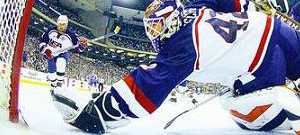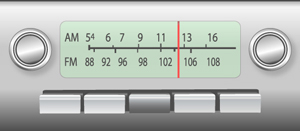 May 18, 2009
May 18, 2009 Don’t go over the self-promotion cliff; crush your local radio station instead.
The more that I read about the latest and greatest music marketing trends, the more I want to stand up on my desk and shout “don’t go over the cliff with the rest of the lemmings!” But, given the current hype and the herd mentality that artists usually exhibit, twenty-four months from now 5,000,000 artists will be using Twitter and fan relationship management tools to attempt to acquire fans and/or to boost average-revenue-per-fan (ARPF). When I think of the prospects of millions of artists traveling down this road, ARPF is exactly what I want to do. Three years from now, most artists will be disappointed and a new crop of artists will be jumping off a different cliff altogether (remember the MySpace cliff?).
The famous hockey player Wayne Gretzky once said: “A good hockey player plays where the puck is; a great hockey player plays where the puck is going to be.” In this post I want to uncover the obstacles to self-promoting music and suggest an alternate path that will take you where the puck is going to be.
Self-promotion obstacle one - online fragmentation
The Internet is not one big homogeneous, connected web of word-of-mouth amplifiers. The reality is, music consumers are frequenting a hundred different disparate sites and they are engaging with music in a myriad of ways. An artist is extremely fortunate if he or she can attract a large audience within one or more of these online fragments at a time. Great songs do go unheard. Don’t buy into the hype/myth that putting your songs into ten online stores and upon fifteen social networks matters. It doesn’t. Consumers need filters and the imprinting that results from radio-like repetition.
Self-promotion obstacle two - geographic fragmentation
The English-speaking world is comprised of over 1.6 billion people. The fragments that may enjoy your brand of music are going to be spread out all over this world. The combination of online fragmentation combined with geographic fragmentation is a matrix of target and reach challenges that’s extremely difficult to overcome given the promotion budgets of independent artists.
Self-promotion obstacle three - the need to obtain multiple impressions
Once you have sorted out the fragmentation obstacles you have to start thinking about obtaining multiple spins for your song or video. Depending on the song, after a certain number of spins and/or live appearances, some X percentage of listeners may become fans; chances are it’s going to take more than one spin. Previously, it was easy for music marketers when radio was the biggest source of repetition; now spins have to be had within a variety of devices (iPods, cell phones, laptops, etc.) and upon a variety of ‘radio’ options (terrestrial, internet, satellite, cable TV and wireless).
At this point in the post, visualize the multi dimensional music promotion matrix that includes online fragmentation, geographic fragmentation, network fragmentation, device fragmentation, consumer preferences, and consumer behavior.
Self-promotion obstacle four - delivering the right online value proposition
A value proposition answers the question: “What does this product or service do for me?” Does the product make me smart? Does the product make me sexy? Does the product make me healthy? What does your music-related website do for me? For 99.9999% of all artists, the answer to that question is: your website informs me and that’s it. Your site tells me: who you are, where your next show is, what you look and sound like, how to obtain your music, and how to purchase your tickets or merch. What you site probably fails to do, is to truly entertain ‘me’ (as in consumers).
A playlist filled with your songs, two of your videos and pictures of your cat is not entertainment that can compete with all of the other forms of online entertainment, and it’s probably not entertainment that you can build a sustainable, product-shucking, cash-generating brand upon. To begin to solve the puzzle of obtaining multiple impressions on a low budget from a highly fragmented and geographically dispersed target audience comprised of overloaded consumers that don’t want to spend more than .99 cents for a song, you are going to have to grow beyond ‘informs me’ to deliver ‘entertains me’ and more.
Self-promotion obstacle five - overloaded consumers
Five years ago, in any given marketplace the impressions (the spins) were simply delivered through five to seven competing radio stations featuring separate to overlapping genres of music. Now, not only have the listening options expanded, every kid with an electric guitar and a TuneCore account is promoting music. Self-promotion will not scale; there are not enough receptive consumers to absorb the marketing messages or to take on the spins that are needed to convert listeners into fans for all the artists attempting to do so. When three million artists start pounding out emails, tweets and fan management action items, the whole lot of you will start to seem like stockbrokers at a cocktail party. 
Self-promotion obstacle six - minimal ROI
Dollars that were once earned from three to four revenue sources are now pennies earned from hundreds. Given the investment you have to sink into solving the Rubik’s promotion cube divided by the revenue you generate from all sources, the return seems hardly worth bothering over. When a million artists generate one dollar of revenue each, who makes the real money? The aggregators that collect a percentage of every dollar processed are the ones generating a reasonable return on investment; it’s certainly not artists.
Yes there are independent artists earning a sustainable living, and there may even be one or two that are making a lot of money. However, show me another industry where the gross / aggregate investment (time and money) across all of the participants generates such a negative ROI. When this industry had (past tense) a massive upside lottery component to it, the potential reward mitigated the risk. Now, if you are going to go over the dream-chasing cliff that the tech providers are currently peddling, you better be doing it for the love of your art (period).
Go where the puck is going to be…
Look at the fragmentation of the music consumption marketplace this way: genres are coastlines, niches within genres are beachfront properties, and standalone artists are rocks or grains of sand. Sticking with the metaphor: coastlines and beachfront properties are compelling, interesting and entertaining; rocks and sand are things that get stuck in your shorts and sandals.
IMPORTANT - the competition for consumer mindshare (when it comes to music consumption) is going to be fought on the battlefield where the war is over which ‘channel’ can deliver the most compelling entertainment (underline) to any given market segment. Moving forward, trusted entertainment channel providers - filters that can continuously find great songs for a niche - will have access to consumers as surely as consumers desire to gain access to the beach; alternatively, attempts by standalone artists to ‘manage’ relationships with fans will be as welcome as sand in a sandwich. 
Pick a niche, band together, form a channel, attack radio…
Radio stations and the radio industry are vulnerable right now. The radio spectrum, the broadcast antennas and the satellites that define traditional radio are becoming an expensive liability (think debt service and operating costs). More and more consumers are switching to online listening (internet, iPhone, etc) as the preferred method to consume ‘radio’ programming. When this happens (and it’s happening) there’s really NOTHING that a conglomerate of artists can’t do FAR better.
Better than radio…
When it comes to being the ‘channel’ that can deliver the most compelling online entertainment (to a targeted niche) radio stations can’t compete with an organization of artists and/or rightsholders working together (referred to as ‘you’ from this point onward). Here are just some of the distinct advantages ‘you’ have:
Advantage one - the cost advantage. Radio stations have legacy costs (mentioned above), they have to pay royalties and they have high (relative to you) operating costs. You can put together an operational and a legal structure where all your costs are far less. Moreover, you are probably going to be selling your own product (music, tickets, merch, ringtones), which means you don’t have to attract numerous annoying advertisers (ads are annoying); just one or two sponsors will probably suffice.
Advantage two - the entertainment advantage. Just streaming music is yesterday’s entertainment. Broadband speeds are expected to rise substantially over the next few years, which will increase demand for all forms of high definition audio and visual content. Your ability to provide hours of HD video and thousands of relevant images (think high resolution, flat panel wallpaper coupled to music) blows away what a radio station can provide; moreover you own it, radio doesn’t.
Advantage three - the niche advantage. Radio stations stock their playlists to satisfy the widest possible segment within a genre; it’s the most common denominator approach that mass-market media outlets always pursue. This won’t work on the Internet. The Internet is about sub-segments, fragments and niches. You can splinter a radio station’s audience by promoting a superior entertainment product to a sub-segment of listeners.
Advantage four - the personality advantage. You are not bound by the restrictions placed on radio and you are not (should not be) confined to the traditions and practices that define the personality of radio; you can be something completely different. Furthermore, the local radio station jock is a middleman between you and your fans. Within your online community, you (collectively) can supply highly relevant, direct, continuous and simultaneous interaction.
Advantage five - the promotion advantage.
Take away radio’s satellites and antennas (which are becoming irrelevant), and you are competing against five guys withering under relentless budget cuts that are trying to survive an unprecedented downturn in ad revenue receipts. Your ability to leverage 100 artists and 100,000 fans to promote (for free) a single brand / community will trump anything these low budget operations can put into a niche market. Furthermore, an organization of artists pulling together can overcome every promotion obstacle listed above. 
I found the puck, how do I score?
Clearly, there’s a lot of wood to chop to take on radio stations in any market or niche. This is a blog post not a book, so there’s lots of missing details… Here are some execution ideas and obstacles to think about.
Stocking the pond…
It’s essential to find unencumbered songs (no strings attached - any deal is possible) that squarely appeal to the niche you are targeting. Each song will have to meet a quality threshold and you will have to monitor your traction analytics (plays, skips, session ends, downloads, etc.) to determine when it’s time to say goodbye to certain songs. You will also have to set all politics and personalities aside when programming your station. Death occurs for a proposition like this when you start spinning songs and featuring videos because you like the person more than his or her music.
The incentives and the deal structure…
Consider this fictional example:
- 100 artists contributing 100 songs are on board initially - more could follow.
- Participation in the program is non-exclusive.
- (Although, I think exclusivity will ultimately be better for everyone involved.)
- Each artist will send 1,000 fans to the ‘channel’ within a year.
- Each fan will stream every song three times (on average).
- Which means - each song will receive 300,000 spins.
- At a 2% conversion rate, each artist will generate $6,000 in music sales (average).
- Everything takes place over a rolling twelve-month period.
- Due to participation in the channel - every artist will see an increase in show traffic.
- Due to participation in the channel - every artist will obtain a portion of sponsor revenue.
- Due to participation in the channel - every artist will share in branded merch revenue.
- The channel should be jointly owned by the anchor tenants (most popular artists) and management.
- New artists and songs are introduced to the channel through any artist or fan of the channel.
- Note: the numbers above could be much higher or lower depending on the artists and the songs.
Management’s responsibilities…
- Recruit (sign) the first 100 artists / songs / videos and associated images.
- Utilize the latest technology and infrastructure to provide a compelling online home for the channel.
- Deal with all of the legal docs, reporting, payments and tax forms.
- Provide participating artists with everything they need to uniformly promote the channel.
- Eliminate all middlemen that extract percentages.
- Only use services and products that are sold on a fixed-cost, fixed-fee basis.
- Compel participating artists and fans to contribute video and images.
- Put listener-driven, artist-driven and management-controlled mechanisms in place to maintain the most compelling mix of online content.
- Be mindful that you are not managing artists; you are managing an entertainment channel.
Conclusion - do your own research…
Go to compete.com and install the Compete Toolbar into your browser. Although this toolbar isn’t always accurate, it will give you a reasonable indication of how much traffic a site generates. Visit the sites of individual artists that are supposedly building strong standalone brands and compare their web traffic to radio stations, record labels (any size), music bloggers, and to other unique music sites. Then consider what’s really being offered upon any of these websites that can’t be offered by any organization of artists. There’s NOTHING in the technology candy jar now that can’t be simply bought, built or rented inexpensively. The only thing any of these sites have over you (collectively) is the strategic sense to organize a bunch of you to deliver the ‘entertains me’ value proposition versus the ‘informs me’ value proposition that you are delivering now.
Just to be clear, I think a lot of the promotion technology in the marketplace is great stuff. I just don’t agree that using it to promote standalone artists is the best use of anyone’s time, as it would be far more effective to promote a destination (preferably owned by artists) that has a lot more ‘inventory’ on the shelf.
Here’s a possible scenario for the distant future:
- Channels will bid for the rights to exclusively feature songs and/or artists.
- There will no longer be radio stations that play new music.
- There will no longer be content aggregators.
- iTunes will relegated to back catalog; new songs will be on channels.
- Widget providers will merge into channels or disappear all together.
- There will be no music-related websites/social networks other than the channels.
- Artists will own a chunk of the channels (teams) they play for.
- Consumers will simply flick (think iPhone) from channel to channel.






Reader Comments (49)
Very cogent thoughts. The challenge for any artist is to overcome the technical barriers (ie. creating an online radio channel) with limited technical know how. But this is a very cool jumping off point.
This is a great post. You've laid out the promotional problems for artists better than anyone else I have read. You've said the truth: no matter what most artists do, they won't pick up enough fans to make their efforts worthwhile. And the more artists who copy any particular technique, the less effective it becomes for everyone.
I'll have to think through your channel idea. It sounds very interesting. The Hotel Cafe tour and showcases have functioned along those lines. I suppose the only problem I can anticipate right now is to find 100 artists who are good enough and willing to work hard enough together to collectively promote something like this. But festivals have been able to bring together that many artists, and it's in their self-interest to promote the festival, so this could be considered something similar.
This is kind of what RCRD LBL has going, they we're described as part music blog part record label, but really it could be described as a channel delivering constant entertainment value.
Bruce,
So much to digest here. But also so much that I know is true from my own efforts at finding an audience on line. I have had an idea of generating a niche based web concept and this mat be where I need to put my energy.
Many thanks!
I like the idea. It makes a lot of sense.
But one thing: are there so many talented musicians that the number of these "channels" will also be too hard for people to wade through?
Great post. People still need to find ways to organize the music they listen to, so listening to several niche channels won't be a problem.
Also very consistent with things I was thinking about while attending San Francisco's MusicTech conference today. Scary!
I just meant, what if there are 4500 excellent "soft jazz" channels...you now need a filter to find one of these channels that are good, instead of a filter to find individual artists pages.
This sounds like the industry is still struggling to find new ways to monopolize music. Honestly I don't think this will work. By destroying local radio stations (college & community, as opposed to all of the other stations that already don't play new music) and by segregating genres by channels, this will prevent new styles of music from emerging. Segregation is not the answer.
@Ryan
Who's preventing new styles of music? I'm talking about something human owned and operated. I think you are confusing segregation from segmentation. Consider the segment of people that like fast-paced music on Friday night - that's a segment; no segregation considered.
Industries are destroyed and created all the time. Radio is on the way out and something new and more vibrant is going to replace it.
This is the best thing I've read on the music biz in awhile. Thank you.
Gotta ask, though...have you calculated the bills for an operation like that? Streaming music to a mass audience is EXPENSIVE. This is getting into a realm that could break indie artists overnight.
With a blog, the "Digg Effect" will often just cripple your servers. Once an indie operation like you've outlined here starts dealing with that kind of overnight success, costs will skyrocket, too. That's a whole other kind of cliff.
Eventually, you can use ad income to offset costs, but you'd need capital set aside to survive the transition. You can only court advertisers once you've got a proven history of getting traffic, and in the meantime your bills are due every month.
@ Bruce
I agree with you that something new is coming. In my personal opinion I think what's coming in the music world is what is happening in the world of newspapers: hyper-localization. I don't think radio will disappear, I think radio will stick around but it needs to provide the content that people can personally relate to (what's happening in their back yard). The Internet is a cold dark place and people are starting to desire more tangible relationships with musicians.
@ justin - If your content is compelling and your audience is ramping, there's no way your expenses should exceed your income (unless you are YouTube). I think I am just going to have to put one of these together to gather the actual data. There are ways to keep your streaming costs down and there are ways to ramp your revenue proportionately. Increases in streams equates to increases in traffic, and there are lots of ways to monetize traffic. It should all be profitably proportionate. (as an aside, have you seen TargetSpot - http://www.targetspot.com?) . Don't forget that you won't have to pay 'protection' money to the labels...
@ Ryan - I agree 'radio' will stick around, but what is radio? Take away the antenna and it's some human programming a stream of music and information. Hyperlocalization works for news, crafts, food, etc. For music and entertainment, localization is one form of specialization, but you can also dice the market horizontally, vertically and diagonally - all can be equally appealing and warm.
Great Article, very informative but I do have some qualms. I know you said that "promotion technology in the marketplace is great stuff" but you also felt that it isn't worth it for a Stand Alone Artist. Your Channel idea has some very good points, a tribe of like minded music can be very powerful, but it is because of Stand Alone Promotion(Twitter, Facebook, etc) that a Artist - Fan relationship can become personal. I do understand the benefits of having Segmented Channels but I am certain the entertainment value is not more important than the value of being informed. Every Band is a Brand, your Entertainment Channel says that self promotion should be traded in for the promotion of the Brand Identity of the Entertainment Channel - I disagree.
The Entertainment Channel is Radio, just in a different form. If you program it to work on a phone then what? Instead of hearing it through your car, its through your phone. The only major difference is... Stand Alone Promotion for a single Band is more essential, you have to distinguish your band from everyone else.
Ibrahim,
You can certainly have a standalone brand and a relationship with your fans. However, it makes far more strategic sense to have 100 artists (for example) driving traffic (with those great tools) to a single destination, than it does to have each one of you standing on an island by yourself yelling "visit me". If 100 of you stand on the same island and yell "visit me" more people are going to take notice.
If you have 99 other artists promoting your song(s), then you are going to obtain the spins you need to convert listeners into fans; then you can think about building your own island.
Also, it's only 'radio' if you make radio; even so, everyone wants to be on the radio right?
-Bruce
"I agree with you that something new is coming. In my personal opinion I think what's coming in the music world is what is happening in the world of newspapers: hyper-localization."
I've been focusing on local music scenes for a number of years now. Most musicians have day jobs, so extensive touring isn't an option. This doesn't necessarily mean they aren't good enough to tour. Often they have other priorities (like families). If anything, not depending on music to pay their bills gives them more creative freedom.
Similarly, current economic conditions mean that many fans don't have much money to spend on music. But when they can get together with friends and hear and play music, that brings music into their lives. Music will always be in our lives, but the rock star era may be over.
I was very excited to read this earlier today, and now that I've mulled it over I'm still pretty stoked. The way I see it, it's somewhere between radio (albeit with a tighter niche and a longer range) and the "group brand" Bruce was talking about early last year.
At the time I loved the idea, but somehow didn't think it would scale. I couldn't see how I would find 45 bands (or 100) that appealed to my niche audience and were producing digital content. But that was last year, and I've thought of about 10 since lunchtime, all of whom I can contact through Twitter, Myspace or Facebook and count on to produce videos, photos, blogs, Audioboos and the rest.
I'm not going to get hung up on the technical limitations. I managed to live stream Ben's Big Gig to 300 people from a laptop and a couple of phones over broadband and 3G. There's always a way.
I look forward to seeing how people roll with this idea. ;)
Y'alls optimism is contagious and I'm grateful for it. Gonna go run the numbers again.
this is a brilliant article..really eye opening to the reality of online music promotion...i find myself frustrated with too many options, and unsatisfying results..
and u r right it comes down to the factors listed here in this article...there is too much hype behind the current trends, twitter, facebook etc etc..all social networking sites...
i love the idea of niche portals, providing collectives of artists...brilliant...i can really see it would work that way..thanks for the article..very helpful
-m
www.straytheoriesmusic.com
"You can certainly have a standalone brand and a relationship with your fans. However, it makes far more strategic sense to have 100 artists (for example) driving traffic (with those great tools) to a single destination"
Bruce,
I felt that you were tossing away the idea completely of using the tools that are beneficial to the success of a stand alone artist.
Of course it is beneficial to work as a Tribe, every effort is more effective and as you described, much "louder."
"If you have 99 other artists promoting your song(s), then you are going to obtain the spins you need to convert listeners into fans; then you can think about building your own island."
Is that really the best analogy for the Channel idea? If in the end, the intention is to go back to having your own Island? Why not just start with your own Island first as a Stand Alone Artist? Those wonderful tools are also where the people are at. A few million here, a few million there. Is that really fragmentation? Self Promotion done correctly dismisses your idea of fragmentation. Fans, scattered throughout the web. These tools can help you reach them with a little communication.
I agree with your Channel Idea but I disagree that there is too much Fragmentation and that it is a Self Promotion Obstacle, the tools are essential.
Also, it's only 'radio' if you make radio; even so, everyone wants to be on the radio right?
Very good. Thoughtful stuff. Here's the rub:
You will also have to set all politics and personalities aside when programming your station.
(ah yes - we are human after all)
Then there is this:
Just to be clear, I think a lot of the promotion technology in the marketplace is great stuff. I just don’t agree that using it to promote standalone artists is the best use of anyone’s time, as it would be far more effective to promote a destination (preferably owned by artists) that has a lot more ‘inventory’ on the shelf.
(agreed - especially the artist owned bit)
Simplicity is the key to complex forms in nature. The fractal web will create its own systemization. Artists should be stakeholders in their future.
Brad Parker
Co-Founder
www.muzlink.com
Are all of you interested folks going it alone, or are you banding together? I am interested for sure, but this could made far more appealing by hooking up with "like music-minded" people upfront!
Lemme know.
This is a very interesting article; much of it sounds feasible, even likely.
One of the most forward-thinking pieces on the changing music industry that I've ever read, bravo Bruce. Some concerns, however. The first is, there are many other types of AUDIENCE fragmentation that you don't mention--age, sex, nationality, etc.--which, when cross-sectioned with the fragments you do mention such as genre and niche (the latter of which seems to be shrinking daily thanks to the internet) would seem to leave a pretty small piece of the pie. Geography is another fragmenter which you mention but don't seem to emphasize. Most of us indie bands don't do much touring outside of our own region and therefore the real network of other similar bands is significantly fragmented geographically.
That leads me to the burden of just getting a project like this off the ground. Simply tracking down and organizing 100 artists who fit into said thin pie slice and setting up the "station" would seem to require much more time (most indie artists have day jobs in addition to the time they spend on music) and money (indie artists usually have very little) than most indie artists will be able to spare.
All of that said, I could see this as part of the purpose of "labels"--to organize a group of artists into a niche. I can imagine a time when "labels" might "sign" artists to become part of such an entertainment delivery station, and frankly, it would be a breath of fresh air compared to the current model because it would bring the focus back to the art (i.e. if your music and visual styling fit the niche we'll all make money).
You got my attention. I read everything you wrote and enjoyed it.
But, I vote for the mix tape over this. I think good mixtapes will make a lot more money much faster than doing everything you wrote about.
let me repeat another post:
This is the best thing I've read on the music biz in awhile. Thank you.
The best thing I've read on independent music promotion in quite some time. Every musician tweeting, myspaceing and facebooking just leads to every musician tweeting, myspaceing and facebooking.
@ Ibrahim - I think we are on different planets. We will have to just agree to disagree. The whole point of the post is that artists working together can get far more traction than artists working alone. Once you have a significant audience, you can choose to splinter off. However, if the organization is constructed correctly, most will see the benefit of continuing to work together. If you think standalone artists that have never been on the radio are doing exceedingly well, please provide us with a list and some revenue and traffic numbers.. Cheers..
@ Everyone - nobody needs 100 artists to get this going. Start with one or two. I will cover this in a subsequent post.
@ Ian - I spent fifteen minutes on that geographic graphic :). As far as other demographics go, I like to tell this story: I was stopped at an intersection about two years ago. I looked over at the 45-year old trucker that had tattooed arms the size of tree trunks and he was singing at the top of his lungs. When I turned down my radio, I was blown away that he was singing 'Girls Don't Cry' by Fergie. (I think he had tears in his eyes.) Right then and there, I decided that demographics and music are an oxymoron. I have come to believe that "demographics" are hard to pin down for a lot of songs; some genres can be pigeonholed (emo), but most songs cut across all lines these days (it seems to me)..
@ William - Can you clarify your comment a bit.. Mix tapes (if I get what you are thinking) are great, and they would be great channel content, and I see them as a high-margin revenue source also. Can you describe how you envision generating revenue from 'mix tapes'. I want to see if we are on the same page. Thanks!
>>@ William - Can you clarify your comment a bit.. Mix tapes..... Can you describe how you envision generating revenue from 'mix tapes'. I want to see if we are on the same page. Thanks!<<<
Sure Bruce,
I think the statement below is key for the physical side of mix-tape selling, especially in 5 to 10, maybe 15 USA music markets where there is plentiful supply, demand and a large college market. A typical city like this would be Boston and others like them. Take your pick. And, everything else you said about creating a valuable “entertainment channel” online that will reach beyond the local area is right on.
re: >>>Moving forward, trusted entertainment channel providers - filters that can continuously find great songs for a niche - will have access to consumers as surely as consumers desire to gain access to the beach;<<
But, a non-technical Web 2.0 solution can address the problem for certain local market artists.
They have it when they wake up in the morning every day. They hear and think about it often and it sounds like this: “I know my music is okay because enough people are interested in it (track play traffic, shout outs, respect, local radio spins, etc), but I don’t get enough salary from the music business I’m in” – which is why they hope for the “Hi I’m a record label looking to sign you,” phone call /email.
So, an organization assembles a few artists with that problem in their heads. The organization does its due diligence to verify certain assumptions about that artist and its consumer market. This organization looks like AccountTemps, Kelly Girl Services or a similar styled temporary agency. The temp employees become the musicians. The organization takes on "ownership" of their problem.
It may remove all their obstacles for self promotion. Sales Managers produce the selling opportunities then the temp staffers ( the musicians) show up and execute. The online Entertainment Value Channel isn’t forgotten. Its part of the solution but its not the only solution in this case. The web site’s role is that of an office. It becomes a management tool and has a marketing function able to mash in entertainment value assets.
Imagine that!
Artists go to work as salaried employees for themselves selling their own music and participating in profits made by the firm, non-exclusively. They'll escape their part time jobs if they want to and may be able to focus totally on the music and other lifestyle choices, like family, so on, so forth.
Voila!.
Would they want to do that? It is desirable accountability for an investor. It pays a wage to a musician working in a non music-related part time job.
As it is in all other reasons for self-promotion, the bottom line is this process has to sell units, move product and derive related or non related music income streams. I wouldn’t call it a record label. This temp agency concept looks more like a Girls Scout cookie selling operation.
It will take an upfront investment.
Let see: throw in $10,000; recruit three artists at $10/hr, and obtain rights to sell their product; put a great Sales Manager Leader on. Budget one time $5,000 for a web site and Sales Manager. Provide $5,000 to artists (temp salaries) and put them to work selling The three artists are expected to sell 1,500 units during a time frame of 500 hours collectively based on an average unit price of $10. 1,500 units times 10ea is $15,000 gross plus sales income from activities by the sales manager
I think income will come in this way before it does with a pure online play for these musicians.
A good sales manager could produce surprising results and the artists will expect them to deliver on profit sharing and remove their headaches.
William - I like the way you think.. Good stuff. Are you in the Boston area?
I agree with most of your thoughts.. I like to have "more inventory on the shelf" if I am going to be staging an organization to sell something - the conversion rate goes way up..
-Bruce
Bruce/William,
Very interesting discussion. I think I get what you are saying but if you can clarify a couple of points. What kind of units are you talking about? An amalgamation of content? Albums, DVD's, Single Tracks, soft good merch? Since the album is dying I'm guessing when you say units you are talking something besides traditional album sales.
A good sales manager (aside from motivation and organizational skills) would seem to be someone who has a lead list that the temps could solicit to, but that lead list would seem to naturally be music fans, and the biggest lead list would seem to be those acts that have the largest following would it not? So really it would be the temps who are bringing their own leads to the table or am I not thinking about this accurately?
Very interesting stuff.
Excellent, and I mean bordering on being an absolute necessity for any of the zillions of bands,
singers, songwriters, etc., to read and believe.
In my 45 years in music I've seen so many changes I could never keep up with exactly what to do, now, since the Internet came into play...well, the entertainment universe has changed and most of us don't know where in the world to go with our product.
Keep keeping me informed and remember, 'there's only one show business."
Hi Bruce,
Thanks. I have really enjoyed reading your post. I've read it several times and I like the way you think too. Really good stuff. I'm in Boston following the music scene, and advising two artists whom I consider friends as well. What you said about spreading too thinly across online music social streaming spaces is exactly what I've been telling them too. But, but they want to do that anyway and of course, they want that magic record label phone call. Arrghh!
@geomgmt
They are physical CDs (ouch). I used the word mixtape cause yes, some units can be compilation teasers that drive the standalone classic album package sale on a CD. Isn't it true that industry CD/Album sales revenue is far exceeding the amount of money CDbaby, ITunes, eMusic, Amazon.MP are seeing from digital sales? I think most everybody stills owns a CD player too.
A big part of the selling process for the team has to be about plain old everyday door knocking while having the web site Bruce described help them open up some of those doors and finding those special places to intercept pedestrian traffic.
And yes, this:
>> A good sales manager (aside from motivation and organizational skills) would seem to be someone who has a lead list ... the biggest lead list would seem to be those acts that have the largest following would it not?<<<
>>> it would be the temps who are bringing their own leads to the table or am I not thinking about this accurately?<<<
Well, you need their list and you need list they don't have. The right SM has the contacts and ideas about how to use them. May have to Buy some lists too and ask for favors of course. Perhaps a mailman would make a good hire. They know where all the doors are.
Recently, there was an article in the Boston Globe about residents who hosts acoustic concerts in their homes on a weekend night so maybe people are beginning to think more out of the box.
Some of the "other revenue" could come from selling classes to little Johnny who wants to play a guitar when you meet his mom at the residence. You've seen a lot of DVD extras where the guitarists shows you how he made that run...something like that. And, a homeowner could book the artist for a little backyard BBQ concert for neighbors. Take in a wine expert with you and make it special...
Selling the CD direct this way is not a new idea really. Its been done with newspapers before.
Great post! Great idea! I'm doing it!
@ amy..
leave a comment OK. Not an advertisement please.
Clear Channel and Front Line partner to launch artist driven online stations:
http://www.hypebot.com/hypebot/2009/06/are-artists-the-new-gatekeeps-clear-channel-radio-front-line-mgt-think-so.html
Thanks,
What I think you have outlined is something like how capital will acquire ownership of the new music environment.
Your point about urls providing entertainment for a niche cluster is especially important.
I will bear this in mind when developing nzmusicblog,com. Being reminded to get away from the down home and boring bits of digital paper pages most musicians websites have been takes some doing. The challenge - to develop an engaging experience a target group will want to access - not so easy.
Nice to think we could keep one step ahead, for awhile at least.
this article just felt like the author was saying....'anyone who is trying the diy approach is wasting thier time'. He makes some great points, and I think his model would be a great part of a marketing mix....(just not the whole cake!))...Maybe myspace isnt what it used to be, But dont tell that to Soulja Boy and his fans!
The Internet is not one big homogeneous, connected web of word-of-mouth amplifiers.)))))....................THIS IS TRUE BUT THATS THE REASON THERE ARE MARKETING METHODS DESIGNED TO MAXIMIZE ONLINE PRESENCE....(((EVER HEARD OF PUBLICITY, WEB RINGS, OR, OR CHEAP ONLINE ADDS TO POPULAR NICHE BLOGS.??)))...............................................................(((((..The fragments that may enjoy your brand of music are going to be spread out all over this world.))))) ....................BELIEVE IT OR NOT BUT KIDS IN ENGLAND AND OTHER COUNTRIES THAT MAY LISTEN TO HIPHOP FOR INSTANCE........ARE VERY AWARE OF A SITE LIKE ALLHIPHOP.COM...OR SOHH....//MUSIC BUYERS ARE MORE SAAVY THAN THE AUTHOR IS GIVING THEM CREDIT FOR.............................................((((((Previously, it was easy for music marketers when radio was the biggest source of repetition; now spins have to be had within a variety of devices (iPods, cell phones, laptops, etc.)))))))..........AS FOR THIS POINT....I WOULD SAY...WORK YOUR RECORD REGIONALLY.......AT THE STREET LEVEL WITH FREE COPIES..., COLLEGE RADIO, .....PUSH THE SINGLE ON THE STREET......LISTEN FOR THE BUZZ TO COME BACK AS TO WHICH SONG IS A FAVORITE.....AND THEN HIT THE CLUB DJS.....(IF IF YOU HAVE TO BUY THE GUY A BOTTLE OF HEN TO GET IT PLAYED)))...................................................((((((....A playlist filled with your songs, two of your videos and pictures of your cat is not entertainment that can compete with all of the other forms of online entertainment......)))))..............THIS IS TRUE, ...HOWEVER I WOULD HOPE IF YOU ARE AN INDIE ARTIST....YOU WOULD HAVE THOUGHT ABOUT YOUR LOOK, YOUR VIEWS, AND BASICALLY YOUR WHOLE VIBE........WHEN 50 CENT CAME OUT....HE DIDNT EVEN HAVE TO OPEN HIS MOUTH....HIS LOOK SAID IT ALL.....TUPAC ON STEROIDS!!!!!!............A PICTURE IS STILL WORTH A THOUSAND WORDS....JUST LIKE THE LATE GREAT MJ....YES YOU NEED TO BE VISUALLY COOL...OR INTERESTING LOOKING....!!!! ...THE FAN JUST NEEDS TO LOOK AT YOU AND KNOW THAT YOU REPRESENT WHO THEY WOULD LIKE TO BE!!!......THATS IT...ITS NOT ROCKET SCIENCE!!!.............................(((((((Dollars that were once earned from three to four revenue sources are now pennies earned from hundreds. ))))))))))......................LOOK NOWADAYS YOU NEED TO BE SELLING SOMETHING ON THE BACK-END.....FIRST YOU BUST YOUR ASS AND GET KNOWN.....THEN YOU HAVE TO FIND SOMETHING TO ATTACH YOURSELF TO THAT THE SALE OF CAN GENERATE YOU SOME DOUGH!!!...........NELLY WAS SELLING THAT APPLEBOTTOM STUFF BEFORE HE EVER GOT A DEAL.....AND MAYBE IT WASNT SELLING THEN ...BUT EVENTUALLY YOU SEE THE END RESULT.......(((DONT LET THE AUTHOR PANIC YOU JUST BECAUSE YOU DONT SEE A MILLION THE FIRST YEAR OUT......NOW THIS BUSINESS IS A BUSINESS FOR THOSE WHO ARE IN IT FOR THE LONG HAUL...NOT SOME BUSINESS MAN LOOKING FOR A ROI NEXT MONTH!!!!!!.......................
DONT GET ME WRONG!!! THIS IS A GREAT, GREAT , GREAT ARTICLE!!!...I MAY HAVE MISINTERPRETED.....SOME OF HIS THOUGHTS ON THE CURRENT INDIE DIY ETHOS.
^^I wish you'd formatted that readably, then I could comment on it, but....I'll just assume you made some good points.
I'm speechless..up until now I thought I only neeeded to hit every internet site and hoped for the best....But the sad thing about me is the problem of having a artist who just turned 16 and 100 other artist that are 25-30 years older, with crappy music that want to join our team...I guess for me all I can say is....... woe is me.....But I must truly say I am more informed now than I've ever been...I actually was turning my nose up at mixed tapes...I see that there are promises with that....I guess my only concern was how do i profit......Special thanks to Carlton, william and bruce and everyone else....guess i'll keep my ascap daily brief
This is a fascinating article . . . and it probably just saved me a load of money on buying Facebook ads, although, granted, music is not what I'm offering. But the reminder not to follow people over the cliff (in addition to the reminder that there are return rates less than 1 percent, no matter how big the pool of potential respondents is) has been exceedingly helpful. Thank you.
So, we have to be radio programmers too now?
What about songwriting? What about sleeping?
These guys are already doing this www.afcollective.ning.com - genius
Please, don't forget the value of MySpace - when I hear the name of a local artist, the first thing I do is ask them for their MySpace URL, so I can check them out, see if they're any good. I've found some of my favourite local artists through MySpace. I'm a real music nut, and if I hear the name of a local band, I WILL get their URL, if they're good I'll spam all my friends and ask them to listen. Facebook is also useful, especially if said band has a regular page instead of a fanpage - I can suggest friends, who most of the time don't even know their music (most of my friends don't use MySpace) and eventually they'll get curious and search out the MySpace (which, in theory, would be on said artist's facebook page).
Also, small artists have it lucky - their music cannot be downloaded from the big torrent sites and the like, because it just isn't there. Nobody's bothered to put it up. That means, just about anyone who wants the music has to buy the albums, unless they have a friend to steal it from.
This is a great, in-depth article.
The Music Void have also looked in great detail at how the music industry can best monetise itself in the digital age.
http://www.themusicvoid.com/2010/04/the-economics-of-making-money-as-an-artist-in-the-digital-world%E2%80%A6/
Brilliant article I must say. I have had an idea similar to this but using TV instead of online radio. I do think one is to do this then it woul have to be a proper radio station which plays hits from the likes of Katy Perry etc intermingled with independent music and has to be a proper radio station.
The admin for this project would be pretty tough to handle but also affordable. My variation of this is as follows:
1. Launch an online radio station or better still from my POV a TV show.
2. Feature music from everyone but have an equitable playlist structure. You are guaranteed play once and then it's up to callers, SMS etc. There's a station here in Melbourne that would play your music once and then it's up to the viewers.
With a TV show you can have an SMS playlist whereby viewers SMS their requests and in return enter a competition.
3. Sponsorships and advertising can come in from members and the music industry itself so people can buy spots of up to 2 mins to kick start their campaigns.
The only flaw is musicians are terribly cynical and once you ask them to invest they will turn their noses up at this and start moaning about why you're charging and call it a scam etc. I have given up trying to find like minded musicians to work with and would rather just feature my own label's output. I do like Jango's idea though I think they need to modify it so that you get into general rotation and basically it depends on the public.
Nice idea all in all and one we are pursuing and will let you know in good time when our new TV show will go into production. This would work like a pop music video show featuring live performers and music video clips.
Going back to the idea. If someone could get an association of independent artists set up this would be ideal. You can then market the site using TV advertising which all the members in each territory pay for.
Hmm I like it. Imagine we called it the MTTStation with Australian artists, UK artists, American artists all promoting the ONE site in their countries but collectively we have one massive site.
I would advise AGAINST the current design of music sites which are terrible for sales. People need to browse and also see new music whilst doing so.
This is exactly what we are doing wit our new label, we have radio facilities alongside it feel free to check out www.acoustic-spectrum.co.uk It launches June 8th with full studio facillities